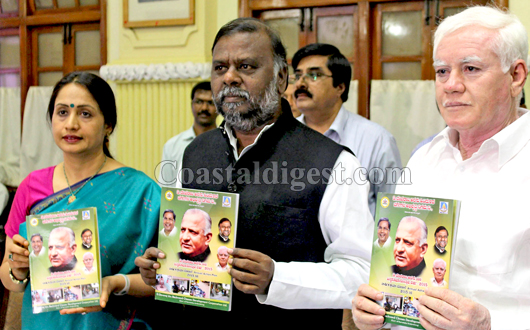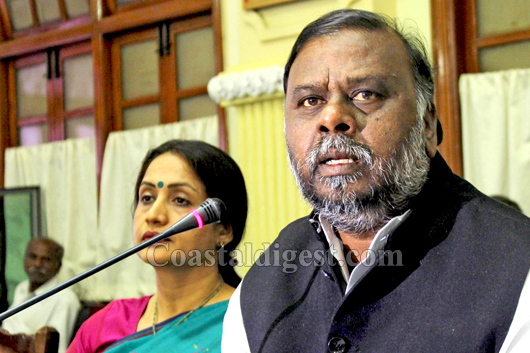Bengaluru, Jun 18: The Social Welfare Department has launched three new schemes for Other Backward Classes (OBC) students including cash awards for merit students to commemorate the centenary year of former chief minister D Devaraj Urs.

Addressing a press meet in Bengaluru on Wednesday,?Social?Welfare Minister H?Anjaneya said that the “Devaraj Urs Pratibha Puraskara” with cash awards ranging between Rs 10,000 and Rs 25,000 will be provided to 2,500 students of OBC communities who have secured 90 per cent marks.
The income of the students’ families should not exceed Rs one lakh per annum. “A sum of Rs 10,000 will be paid to 1,000 SSLC?students, Rs 15,000 to 500 II?PU students, Rs 20,000 to 500 degree students and Rs 25,000 to 500 students studying in professional institutions,” the minister said.
The department will provide assistance to the tune of Rs 10 lakh per annum for 100 students who wish to study aboard.
Candidates whose family income is below Rs six lakh per annum and who score a minimum of 60 per cent in their degree or postgraduate examination can apply for the “Devaraj Urs Study Abroad scheme”.
Under another scheme named after Urs, research scholars pursuing PhDs will be given a monthly stipend of Rs 5,000 per month for three years.
Details of the schemes are available on the website www.backwardclasses.kar.nic.in. Students can apply online by logging on to their website. Post-martic students of Other Backward Classes looking for government hostel facilities can also apply online from the same portal.
Hostel facilities
Last year, as many as 90,765 students were provided free hostel facilities in 869 hostels belonging to the Social Welfare Department.
The minister said an expert committee will be constituted soon to bring out a book on the life and times of Urs. A series of functions will be organised across the state on August 20, to coincide with the birth anniversary of Urs.








Comments
How to apply 4 this scholarship
I have completed 2nd PUC with 83% ...how can I apply this scholarship ?? Please guide me !!
I have completed 2nd PUC with 83% ...how can I apply this scholarship?? Please guide me!!
I scored 70% in 2nd. i belong to 3b category and our annual income is 6000 . Then how can we get a scholarship..?
iam a obc candidate and i pass tenth so i apply merit scolarship so lhelp me
plz
SIR
I scored 86% in 2nd pu in 2018
how can i got scolarship
my income is 20000
my caste is OBC(3A)
I completed my 2nd pu with 89.5 percentage ,how can I apply for this scholarship , please guide me
i have two daughters elder one has passed puc with 65% and younger one has passed sslc with 82% marks. kindly guide us for scholarships
I passed 2nd puc in distinction,how to apply and get scholarship
sir please tell me how to apply for the scholarship
i passed my 2puc in 1st class, how to apply for scholarship
My got 91%.how to apply the scholarship
I passed 2puc in 1st class how to get scholarship
Dear sir,
As my daughter scored in 10th state board exam out of 625/616. pls guide for scholarship process... i am Jain swethamper and service class person so it will be
more helpful to build her carrier
How to apply for this scholarship sir? and when is the deadline date
sir hw to apply fr this and whn is the applying dte
Hi, my daughter Tina Alex.L got 91% in PUC. She need to do Engineering, we are belong to 3B catergory. our Annual income is 80000. for futher studies can my daugher get scholarship or education loan. kindly assist.
Annual income is 11000 so i need schloorship for my higher studies
Respected madam/sir I have completed my 2nd puc with 91%, now I'm doing CA it would be great help if you provide me financial support, and my dad income is 10000. Your help would help me to grow for higher studies.
Please gave me scholarship for my higher education
Thank you sir/madam
Pls help me how to apply for OBC 2A Catergory . for studies in aborad. Pls lets me know the application details.
thank you
How to apply?
Tell me about scholarships
Parents annual income 15000
CaiRP6
How can I apply for this and on which site the link is available
How to apply it and what's the last date??
HOW TO APPLY THIS
HOW WE APPLY FOR THIS
How to apply for this
Student annual income is 11000
Hw to we apply fr ths
last date for applying this scholarship in 2016
Pagination
Add new comment